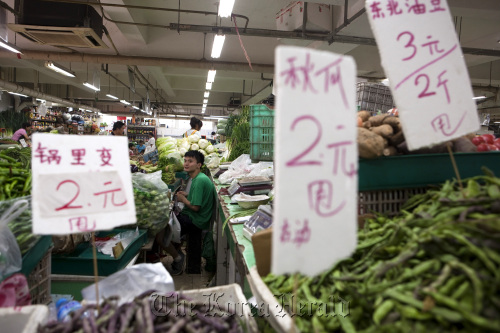China’s inflation accelerated to the fastest pace in three years in July, limiting the scope for monetary easing as risks to the global economy mount.
Consumer prices climbed 6.5 percent from a year earlier, the Beijing-based National Bureau of Statistics said on its website Tuesday. That was more than the 6.4 percent median estimate in a Bloomberg News survey of 26 economists. In June, inflation was 6.4 percent.
Consumer prices climbed 6.5 percent from a year earlier, the Beijing-based National Bureau of Statistics said on its website Tuesday. That was more than the 6.4 percent median estimate in a Bloomberg News survey of 26 economists. In June, inflation was 6.4 percent.

Shanghai stocks extended losses after tumbling into a bear market Monday on a widening European debt crisis and Standard & Poor’s downgrade of the U.S. debt rating. Elevated inflation shows that China is still dealing with the after-effects of an unprecedented monetary expansion during the last global slump and may have limited room for more stimulus.
“This is the kind of data that should trigger an interest rate hike, but the uncertainties in global financial markets may delay the action,” said Yao Wei, a Hong Kong-based economist with Societe Generale SA.
The Shanghai Composite Index, which tracks the bigger of China’s stock exchanges, fell 2.2 percent as of 10:09 a.m. local time. The gauge Monday capped a 20 percent drop from a November high, signaling a bear market.
Producer prices rose 7.5 percent in July from a year earlier, the biggest gain in almost three years, after jumping 7.1 percent the previous month, Tuesday’s reports showed. Food costs climbed 14.8 percent and non-food inflation was 2.9 percent.
“Beijing will obviously be worried about external weakness and global market volatility, but with inflation still too high for comfort we continue to expect one more rate hike in the next few months,” said Brian Jackson, a Hong Kong-based emerging- market strategist at Royal Bank of Canada.
Bank of America Merrill Lynch said that the ruling Communist Party is unlikely to ease monetary policy and may have a fiscal response, including more spending on social housing and water infrastructure. Banks already face risks from lending to local-government financing vehicles.
“In case the global economy slows down sharply, it will hurt Chinese exports and consumption, and the room for China to stimulate itself out of the problem will be smaller than 2008/09,” Vincent Chan and Peggy Chan, Hong Kong-based analysts at Credit Suisse Group AG, said in a report Monday. “There is no escape.”
Analysts at lenders including Standard Chartered Bank have forecast that inflation may have peaked in June and July. Consumer-price gains may ease to 4 percent by year-end on smaller increases in food costs, UBS AG says.
“It’s too early to loosen because inflation is still high,” Paul Cavey, a Hong Kong-based economist with Macquarie Securities Ltd. said before the data was released. “But with the rest of the world looking ugly and the lagging effects of domestic policy moves yet to be seen, it’s difficult to see how there can be much more monetary tightening.”
The government has already paused for eight weeks in raising banks’ reserve requirements, the longest gap since the latest series of increases began in November. Interest rates rose as recently as last month.
The People’s Bank of China said Aug. 1 that it was too early to loosen monetary policy because of the risk that inflation may accelerate. At the same time, weakening global growth may help to tame price pressures as costs for commodities such as oil tumble.
There are signs that officials are confident that inflation will ease. Cooking oil supplier Wilmar International Ltd. has been allowed to raise prices after saying in April that the government had asked it to hold off. The Singapore-based company announced increases of about 5 percent on Aug. 2.
Mizuho Securities Asia Ltd. estimates that full-year average inflation will be 5.3 percent, 1.3 percentage points higher than the government’s target.
(Bloomberg)







![[Graphic News] More Koreans say they plan long-distance trips this year](http://res.heraldm.com/phpwas/restmb_idxmake.php?idx=644&simg=/content/image/2024/04/17/20240417050828_0.gif&u=)
![[KH Explains] Hyundai's full hybrid edge to pay off amid slow transition to pure EVs](http://res.heraldm.com/phpwas/restmb_idxmake.php?idx=644&simg=/content/image/2024/04/18/20240418050645_0.jpg&u=20240419100350)





![[From the Scene] Monks, Buddhists hail return of remains of Buddhas](http://res.heraldm.com/phpwas/restmb_idxmake.php?idx=652&simg=/content/image/2024/04/19/20240419050617_0.jpg&u=20240419175937)

![[KH Explains] Hyundai's full hybrid edge to pay off amid slow transition to pure EVs](http://res.heraldm.com/phpwas/restmb_idxmake.php?idx=652&simg=/content/image/2024/04/18/20240418050645_0.jpg&u=20240419100350)

![[Today’s K-pop] Illit drops debut single remix](http://res.heraldm.com/phpwas/restmb_idxmake.php?idx=642&simg=/content/image/2024/04/19/20240419050612_0.jpg&u=)